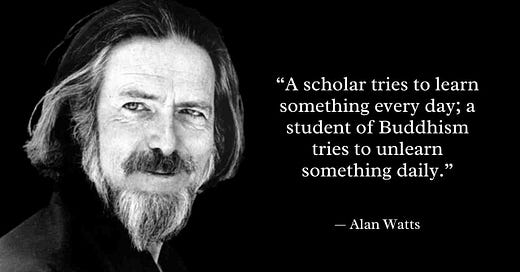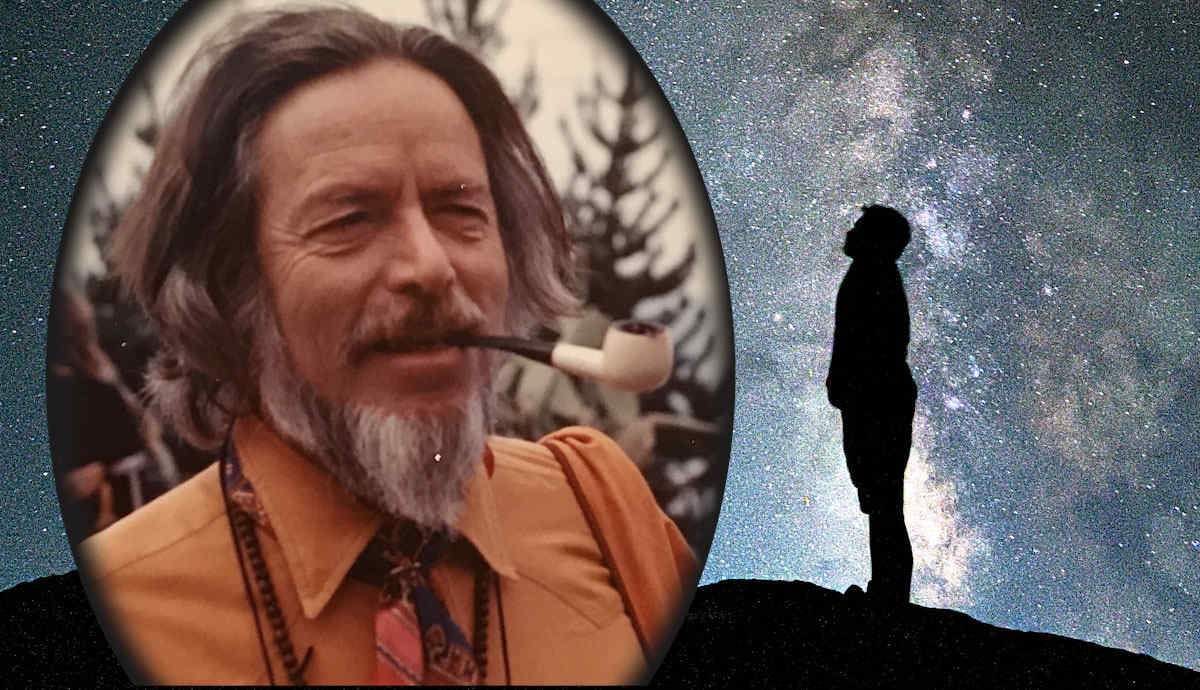The poets and sages have, indeed, been saying for centuries that success in this world is vanity. “The worldly hope men set their hearts upon turns ashes”… The world, they are saying, is a mirage. Everything is forever falling apart and there’s no way of fixing it, and the more strenuously you grasp this airy nothingness, the more swiftly it collapses in your hands.
— Alan Watts
The English philosopher, Alan Watts, was born on this day in 1915.
Watts was a prolific writer and speaker who played an immense role in introducing Eastern philosophy, particularly Zen Buddhism, to the materialistic viewpoint of the West. He helped bridge the gap between Eastern and Western thought, making these ideas more accessible to a broader audience.
Watts, in all his works, encouraged us to see beyond narrow perspectives and embrace a more comprehensive understanding of reality.
As one writer put it:
“Watts didn’t ask for you to follow any creed, or to look to him as a guru or any other self-defeating, self-help drivel. He simply asked just for you to be.” He called on us to shed the facade of the ego and live our lives in a “whimsically poetic way.” A life that “compels you to gaze within yourself and the cosmos around you.”
The following is a passage from one of his finest books — The Book: On the Taboo Against Knowing Who You Are. It’s a book the LA Times once said is a “revelatory primer on what it means to be human and a mind-opening manual of initiation into the central mystery of existence.”
I hope you enjoy it.
The more resolutely you plumb the question “Who or what am I?”—the more unavoidable is the realization that you are nothing at all apart from everything else.
Yet again, the more you strive for some kind of perfection or mastery—in morals, in art, or in spirituality—the more you see that you are playing a rarified and lofty form of the old ego-game, and that your attainment of any height is apparent to yourself and to others only by contrast with someone else’s depth or failure…
If, then, you ask me how to get beyond the ego-feeling, I shall ask you why you want to get there. If you give me the honest answer, which is that your ego will feel better in the “higher spiritual status” of self-transcendence, you will thus realize that you—as ego—are a fake.
You will feel like an onion: skin after skin, subterfuge after subterfuge, is pulled off to find no kernel at the center. Which is the whole point: to find out that the ego is indeed a fake—a wall of defense around a wall of defense … around nothing. You can’t even want to get rid of it, nor yet want to want to…
Understanding this, you will see that the ego is exactly what it pretends it isn’t.
Far from being the free center of personality, it is an automatic mechanism implanted since childhood by social authority, with—perhaps—a touch of heredity thrown in.
This may give you the temporary feeling of being a zombie or a puppet dancing irresponsibly on strings that lead away to unknown forces. At this point, the ego may reassert itself with the insidious “I-can’t-help-myself” play in which the ego splits itself in two and pretends that it is its own victim.
“See, I’m only a bundle of conditioned reflexes, so you mustn’t get angry with me for acting just as I feel.” (To which the answer could be, “Well, we’re just zombies too, so you shouldn’t complain if we get angry.”)
My work and research I put into this Substack Page are entirely reader-supported. If you enjoy the content I provide and are not ready to become a paid subscriber, you can simply make a one-time donation here at Buy Me A Coffee. If you can. I appreciate each one of you who follows this page. You all truly made it into a magical little online community. Thank You.
Poetic Outlaws has a new shop! Nothing big. Just a few T-shirts and some coffee mugs. People seem to like the logo and I’ve had many requests for some shirts/mugs showcasing it. Anyway, here it is. Thanks for all the support.







Sam Harris has all of Alan Watts live lectures on his Waking Up app. It’s worth the subscription to hear the man in his own voice - he is surprisingly (or maybe not surprisingly) goofy and irreverent with a spectacular laugh
Alan Watts was/is one of the great spiritual teachers of this era, no doubt about it. Thanks for this essay.